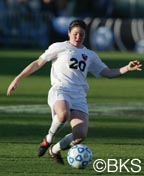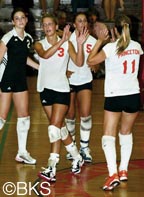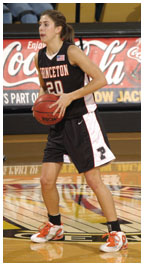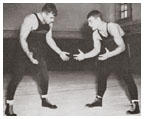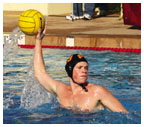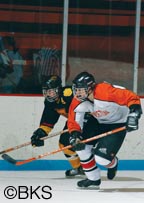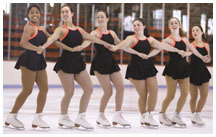January 26, 2005: Sports
Women’s soccer excels, reaches the Final Four
Venable reaches a higher plane
Women’s volleyball finishes strong
Freshman forward sparks women’s basketball
Club athletes chase championships in fall, winter
Sports Scores — Updated weekly
Women’s
soccer excels, reaches the Final Four
Princeton makes history as the first Ivy team
in the NCAA semifinals
All-American Diana Matheson ’08 helped the Tigers win 19 games, including four in the College Cup. (Beverly Schaefer) |
When the Princeton women’s soccer team left the field after its 2—0 loss to UCLA in the Final Four of the NCAA College Cup Dec. 3, the spotlight that had followed the team for three weeks began to dim. But the accomplishments of their record-setting season continue to shine brightly: four tournament wins, a 19—3 overall record, an Ivy League championship, a No. 4 national ranking, and the best postseason finish in league history.
Throughout its tournament run, the team displayed talent, composure, grit, and an understanding of just how special this year was. Parents traveled from as far as Hawaii and California to watch the Tigers go toe-to-toe with the nation’s best. “You’ve got to ride this one for as long as you can,” coach Julie Shackford told her team, “because you don’t know when you’ll be back again.”
Casting Princeton as Cinderella-in-soccer-cleats ignores the team’s impressive credentials. Of 306 Division I programs, the Tigers ranked first in defense during the regular season, allowing eight goals in 17 games, and they were seeded seventh in the 64-team College Cup. But until this year, Shackford’s teams had only advanced past the tournament’s first round once, in 2001.
“We always felt that we had underachieved,” says midfielder Kristina Fontanez ’05. “We knew we had a lot more potential and a lot more to give. Coming in this year, we said, ‘Let’s make it happen.’ ”
After dominating Central Connecticut in the College Cup opener, edging Villanova two days later, and beating Boston College in round three, Princeton faced Washington Nov. 26 in the national quarterfinals. A back-and-forth first half left the score tied 1—1, but the Tigers pounced after the intermission, scoring two quick goals and sending the team to Cary, N.C., for the Final Four.
The Princeton players and coaches had seen the College Cup finals on television in previous years, but being center stage gave them a new appreciation for the event. “The enormity of the Final Four was really unbeknownst to all of us,” Shackford says. “Even I felt like a rookie.”
Against UCLA, Princeton seemed tentative, relying on solid defense to turn away five shots and keep the score tied 0—0 at halftime. In the 47th minute, UCLA’s Danesha Adams drove to the goal and fired a shot past Madeleine Jackson ’06. Bristyn Davis added another for the Bruins 17 minutes later, marking the first time Princeton allowed more than one goal in 2004 and ending its dreams of a national championship.
But even in defeat, the Tigers realized how far they had come in the four months since their preseason tour of Germany, when they played exhibition games against four top club teams and lost each one. “We saw our weaknesses early,” Shackford says, half-joking. More importantly, the trip gave the team a chance to bond, an important step for a group that relied on players from all four classes.
All-American Esmeralda Negron led a group of 10 seniors that included five starters. Negron scored 20 goals, assisted on 12 more, and finished her career as Princeton’s all-time leading scorer. Juniors Emily Behncke and Romy Trigg-Smith earned All-Ivy recognition. Sophomore Christina Costantino, who started all 22 games, was a defensive mainstay, and Diana Matheson ’08 excelled in the midfield, joining Negron on the All-America team in her first collegiate season.
The Tigers were stellar on game days, but for Shackford, practice was
equally remarkable. “Every day was special,” she says. “I
don’t think there was a day when this group wasn’t excited
to get out on the field and train. And they had an answer for everything.”
![]()
By B.T.

Added muscle may have lessened his leap, but Will Venable ’05 still soars over defenders. He also stars in baseball at Princeton. (Photo by Beverly Schaefer) |
Venable
reaches a higher plane
Men’s basketball co-captain showcases uncommon
athleticism
By Sean Gregory ’98
On a fall Saturday morning four years ago, a few ex-Princeton basketball players from New York trekked down to Jadwin Gym to play pickup games with the team. A quiet 17-year-old from Northern California, Will Venable, was there on his recruiting trip, and in one game he drove down the left baseline against James Mastaglio ’98, one of the best defenders in recent Princeton history. Neither Mastaglio, nor anyone else in Jadwin that day, was prepared for what came next.
“Millions of guys have driven baseline on me,” Mastaglio says, “I was riding him a little bit, and was getting ready to go up and block his shot. That’s what I always do.” The 6'3" Venable rose toward the basket, but instead of trying a reverse or maybe a finger roll, he threw down a tomahawk dunk on Mastaglio’s head. “I was left to wallow in my despair,” says Mastaglio. “People from Princeton just don’t ever do that.”
Turns out they do. Venable, now a senior co-captain for the Tigers, had made that Princeton visit on a lark — he was planning to sign with Santa Clara University, near his home — but he fell for the campus and the school’s basketball history. Since coming to Princeton, he has developed into the most explosive Tiger basketball star in a generation. Although he doesn’t fly as high these days – he says his bulk has stolen inches off his leap — Venable was first-team all-Ivy for the 2004 league champs. He has averaged 11.5 points per game on 53.5 percent shooting through this season’s tough pre-Ivy League schedule, which included Princeton wins against Rutgers and Tulane and road losses to Syracuse, Wyoming, Temple, and Duke. Venable also leads the 8—5 Tigers in assists and minutes played. “Will has that sneaky athleticism,” says coach Joe Scott ’87. “He can dominate a game without scoring a point.”
Venable came to Princeton for hoops, but another sport might pay his bills after graduation. His father, Max, was a major-league outfielder for 12 seasons, and the bloodlines have treated Venable well. Last spring he hit .344 for the Princeton baseball team, another Ivy champion, and was drafted by the Baltimore Orioles in the 15th round. Oddly, the Orioles did not make Venable an offer, so he goes back into the draft this June. But teams still have an eye on the outfielder. “His instincts are amazing,” says Princeton baseball coach Scott Bradley, also an ex-major leaguer. “Will is a guy who hasn’t played much baseball, yet he probably hits a breaking ball better than anyone on our team. And the way he runs the bases — the scouts just say, ‘Holy smokes.’”
Despite bouncing around big-league clubhouses as a kid, Venable’s first love was basketball. Max remembers walking into his son’s room when Will was 12. “The door was closed, and when I opened it and turned on the light, there was Will lying on the bed twirling a basketball on his finger,” says Max. “Here was a kid, alone, in the dark, just him and the ball. His passion has always been for basketball.”
But Venable almost lost that passion during his sophomore year. He marched into ex-coach John Thompson III ’88’s office that fall and announced he was quitting to focus on baseball. “To be honest, I was sick of basketball,” he says. “I had fun when I was making plays myself, but in our offense, our plays make plays. Looking back, I was being immature and selfish, and just using baseball as an excuse.” He returned to the team three weeks later.
After Venable proved he could play within the system, Thompson occasionally urged him to create scoring chances for himself. Venable’s speed and strength are especially valuable during the Ivy League season, when teams are more familiar with Princeton’s style, and players must rely more on their one-on-one skills. On several occasions last season, when the offense broke down, Thompson called an isolation play for Venable, and he just overpowered the Harvard or Brown defender. Scott promises the same measured latitude.
With opportunities to play professional basketball in Europe or minor-league
baseball in the U.S., Venable likely will have to make some hard, if enviable,
choices in June. But for now, his mind is on the court. Says Venable:
“We want to get a win in the tournament this year.” ![]()
Sean Gregory ’98 covers sports and business for Time.

Lauren Loban ’05, second from left, led Princeton with 16 kills in the season finale against Penn. (Beverly Schaefer) |
Women’s
volleyball finishes strong
Three straight wins give Princeton a share of
the Ivy title
By Josh Stephens ’97
Parity ruled the chase for the Ivy League women’s volleyball title in 2004 as the league’s top four teams beat up on each other — and the rest of the Ivies — to finish the regular season tied for first place. Princeton was one of them, winning a share of the Ivy championship for the 13th time and the first time since 2000.
In years past all Princeton had to do to win the crown was dominate the now-defunct league tournament. But in the current round-robin format, the Tigers’ fortunes rested on every match. After an unexceptional start, they captured three crucial season-ending road wins to go from 7—4 to 10—4 and a tie with Cornell, Yale, and Harvard.
“Playing in such a competitive league this year was an amazing experience,” said outside hitter Ashley Weber ’05. “We had to work hard for every opportunity.”
Much of that work took place in the back row, where Princeton’s defense, anchored by All-Ivy libero Jenny McReynolds ’07, preserved epic rallies that kept an undersized Tiger squad in contention against bigger, more powerful opponents.
“Our strength was digging and giving ourselves a ton of swings,” said head coach Glenn Nelson. “In the matches we won, we put those swings away, and in the ones we lost, we didn’t.”
With four teams sharing the top spot in the standings, one still had to claim the league’s bid to the NCAA tournament, so the foursome quickly revived their rivalries in a mini-tournament that put the Tigers back on the court with newfound nemesis Cornell.
Half of Princeton’s regular-season losses came against Cornell, and the Tigers again found that some teams are more equal than others as the Big Red swept the games, 30—25, 30—22, 30—26. Cornell later lost to Yale in the finals.
Princeton matched up poorly against an imposing Big Red block, and the
Tigers found determination alone could not get past it. Even first-team
all-Ivy middle hitter Alex Brown ’05 hit a lukewarm .114 in her
final match. ![]()
Josh Stephens ’97 covered volleyball for the Daily Princetonian.

Meagan Cowher ’08 (Photo by Stanley Leary) |
Freshman forward sparks women’s basketball
In the first five minutes of its Dec. 18 game against New Orleans, the Princeton women’s basketball team was struggling to find the basket, launching eight shots and converting none. Then Meagan Cowher ’08 caught the ball on the left side, took one dribble, and swished a 12-foot jump shot. Three minutes and three more Cowher baskets later, the Tigers took a 4-point lead on their way to a 47—36 win.
It was not the first time the freshman had given the Tigers a lift, and coach Richard Barron says it won’t be the last. In the season’s first four weeks, Cowher was named Ivy League Rookie of the Week three times, and through Jan. 5, she made a team-best 50 percent of her shots for the 7—5 Tigers.
Cowher, a 6'1" forward, has a quick first step and a knack for creating open shots, but in high school, she spent most of her time in the low post. “I was always the tall player that kind of pushed under the basket,” she says. “Now, in college, I’m not as tall and not as big, so I’m having to learn how to play outside. I’m still adjusting.”
Cowher has learned through experience, starting every game and averaging 12.8 points in 32.2 minutes per game. Katy O’Brien ’06, Becky Brown ’06, and Katy Digovich ’07 share the scoring load, averaging 29 points combined.
Cowher’s contributions have been valuable, but Barron says she
has room to grow, particularly on defense. “We expect even more
from her,” he says. “Just because she’s led us in scoring
or is a starter doesn’t mean that we’re satisfied.”
![]()
By B.T.

Brad Glass ’53, left, Princeton wrestling’s only NCAA champion, posed with fellow heavyweight Red Finney ’51 in 1951. (Princeton Alumni Weekly, February 16, 1951) |
From humble beginnings in the early 1900s, Princeton wrestling grew to produce league title winners, All-Americans, and a national champion. This year, just over a decade after the team was nearly relegated to history, alumni, friends, and athletes are celebrating the program’s 100th season.
Princeton wrestling will mark its centennial in February with receptions after the team’s home matches against Rutgers (Feb. 11) and Franklin and Marshall (Feb. 12), and a banquet on the evening of Feb. 12. While the focus will be on history, the events will also celebrate the sport’s present and future. “We are very happy about the fact that wrestling continues to be part of the undergraduate scene,” says wrestling alumnus H. Clay McEldowney ’69.
After years of intramural wrestling on campus, Princeton started its varsity program in 1905. The Tigers competed in the student-organized Intercollegiate Wrestling Association (IWA), which grew into the Eastern Intercollegiate Wrestling Association (EIWA). In 1906, Donald Herring, Class of 1907, won Princeton’s first individual IWA title. Herring went on to become a Rhodes Scholar and, according to Alexander Leitch ’24’s A Princeton Companion, “was a dapper heavyweight, sometimes appearing at professional wrestling matches in Newark in white tie, tails, and a topper.”
Princeton won its first league championship in 1911, led by three-time league champion Jacob Frantz ’13. PAW reported the 1911 meet was “so stubbornly contested” that it lasted until midnight on its scheduled date, and two matches had to be postponed until the following Monday. Captain Franklin Wells ’11 captured the light-heavyweight division to clinch the Tigers’ victory.
From 1934 to 1964, legendary coach Jimmy Reed led the Tigers to undefeated dual-meet seasons in 1936 and 1937, a share of the EIWA title in 1941, and an Ivy League championship in 1956. Reed also coached Brad Glass ’53, who in 1951 became Princeton wrestling’s only NCAA champion.
John Johnson took the reins from Reed in 1964, and in the next three decades, he led the Tigers to a remarkable 382 wins behind EIWA champions such as Emil Deliere ’72, John Sefter ’78, and John Orr ’85 (all NCAA finalists), and Dave Crisanti ’86, who notched 85 dual-meet wins.
Johnson’s 1977—78 team marked the high point of Princeton wrestling’s first 100 years, according to program historian and wrestling alumnus Mark Kowal ’75. The Tigers were a perfect 19—0 in dual meets and won medals in eight of 10 weight classes at the EIWA meet en route to the Eastern title. At the NCAA championships, the team placed 14th, Princeton’s best finish in history.
In 1993, the University decided to drop wrestling, citing financial and admissions constraints, but support and funding from alumni helped to return the team to varsity status. In 2002, Greg Parker ’03 brought the program back to prominence, winning an EIWA title (the Tigers’ first in 16 years) and reaching the NCAA finals in the 174-pound division. Parker repeated his EIWA performance in 2003 and finished eighth at the NCAA meet.
This season, the Tigers won four of their first seven dual meets for
their best start since 2000—01, and the program continues to make
history. Tri-captain Audrey Pang ’05 became the first woman to compete
in a dual meet for Princeton on Dec. 4. ![]()
By B.T.

(Photo by Paul Javier ’00) |
In men’s water polo’s NCAA Final Four
opener against UCLA Dec. 4, John Stover ’06 scored with 45 seconds
remaining to tie the game and force overtime. The Bruins recovered and
won 7—5. The Tigers played well in the consolation game the next
day but fell 6—5 to Loyola Marymount. Stover, shown in action against
Loyola Marymount, scored a team-best 72 goals for Princeton, which finished
the year with 25 wins (a new school record) and six losses.
![]()

Princeton’s Jason Hurd ’07, shown in a Dec. 10 game against UMBC, helped men’s club ice hockey to a 9—2 start in league play. (Photo by Beverly Schaefer)
In other action on the ice, from left, Amanda Mitchell ’05, Alisha Holland ’07, Jessica George ’07, Nora Gross ’08, Erin Muckey ’08, and Chana Landes ’06 prepared for the figure skating club’s Jan. 6 show at Baker Rink. (Photo by Frank Wojciechowski) |
Club
athletes chase championships in fall, winter
Women’s rugby wins another league title;
freshman Lin tops competition in table tennis
Princeton WOMEN’S RUGBY, one of the most successful clubs on campus in recent seasons, won its 12th Eastern Pennsylvania Rugby Union Championship in 15 years, defeating West Chester 25—8 in the title match Nov. 7. The team outscored its opponents 300—35, posting a 9—1 record in the fall. The Tigers also dominated Penn State, 36—0, in a nonleague match Oct. 23. The Nittany Lions defeated Princeton in the National Championship final in May 2004. Ruth Bryson ’05 and Natalie Johnson ’05 captained the Tigers, and Liz Inkellis ’07 led the team in scoring with 12 tries this fall.
MEN’S CLUB ICE HOCKEY opened its season with a 9—2 record in the Mid-Atlantic Collegiate Hockey Association, leading the league standings. At the season-opening Wagner College tournament, the Tigers played a grueling six games in four days, falling in the finals to the host team.
In its first season in the Delaware Valley Club Hockey League, WOMEN’S CLUB ICE HOCKEY had a full slate of games against Delaware, Drexel, Maryland, American, Virginia, and familiar rival Rutgers. The Tigers opened with a 3—3 tie against Queenston. Behind the bench, Joshua E. Greene, a graduate student in mathematics, serves as the team’s volunteer coach.
The TABLE TENNIS CLUB hosted an open tournament, sanctioned by USA Table Tennis, in Dillon Gym Oct. 31, reviving a club tradition. The tournament featured three divisions and drew 70 participants. Freshman Pan Lin, one of the top players in the nation in his age category, won the open division. Princeton’s traveling team of Lin, Jason Cherry ’06, Ram Rangan GS, and Michael Hsu ’07 placed third in a Mid-Atlantic tournament Nov. 20.
A strong fall led to an appearance in the national tournament for WOMEN’S CLUB SOCCER. The team entered the regional tournament with a 6—2—2 record and advanced to the semifinals before losing to Delaware, the eventual champion. Princeton earned a wild-card bid to nationals in Austin, Texas.
MEN’S CLUB SOCCER had its best season in recent history, beating Brown and Cornell United (the defending Ivy champs) at the Ivy Club Championships. The Tigers lost 1—0 to Penn in the championship game. In regular season play, the Tigers went 6—1, including wins over Rutgers, Johns Hopkins, Yale, and James Madison.
CLUB FIELD HOCKEY finished the fall with a 6—3 record, narrowly missing a chance to play in the annual Final Four Tournament at Maryland. The Tigers’ three losses were each decided by one goal, including one in overtime against 2004 national champion Penn State.
With music from the movie The Mask of Zorro and choreography from two of the nation’s most respected synchronized skating coaches, the FIGURE SKATING CLUB debuted its winter show, “Freeze,” Jan. 6 at Baker Rink. The club’s tournament schedule includes trips to the Eastern Sectional Championships in Buffalo, N.Y., the U.S. National Synchronized Skating Championships in Lowell, Mass, and intercollegiate competitions at MIT and Delaware.
WOMEN’S ULTIMATE FRISBEE competed at four tournaments this fall against college and post-college club teams, with a successful showing at Haverween, a Halloween Tournament held at Haverford College in which participants play in costume. The team finished the fall with a 13—8 record.
Clockwork Orange, the MEN’S ULTIMATE FRISBEE
team, took the field this fall with just six veterans returning from a
team that placed fifth in a field of 16 at last spring’s regionals.
Fall tournament results were mixed, but according to tri-captain Stewart
Watts ’06, “the pieces are coming together nicely.”
The team will resume practice in February. ![]()

Kim Pearce ’07 scored two goals, including the game-winner in overtime, as WOMEN’S HOCKEY beat Boston College Dec. 12. The Tigers improved to 6—1—1 in nonleague games and 9—4—2 overall.
MEN’S HOCKEY reached the .500 mark when it beat Yale Nov. 23 and improved to 4—4—1. But a loss in the Nov. 27 rematch with the Bulldogs in New Haven started a five-game losing streak for the Tigers.
MEN’S SWIMMING dominated an 11-team field to win the Princeton Invitational Dec. 3—5, nearly doubling the point total of second-place Rutgers. Sophomores David Ashley, Mike Zee, and Ryan Rimmele notched individual wins in the final day of competition. WOMEN’S SWIMMING also finished first at the invitational, beating Rutgers, Washington State, and nine other teams. Stephanie Hsiao ’05 won the 100-meter breaststroke and the 100-meter freestyle.
Caitlin Tormey ’05 led the field in the women’s mile run and Ray Lenihan ’06 won the men’s 60-meter hurdles as MEN’S and WOMEN’S TRACK opened the indoor season at the New Year Invitational Dec. 5. It was the first meet on the renovated track at Jadwin Gym.
WOMEN’S SQUASH sprinted to a 5—0 start, winning four times in two days Nov. 20—21 and beating Brown on the road Dec. 4. Princeton has a 43—2 advantage in individual matches. After losing its opening match to Cornell Nov. 21, MEN’S SQUASH won back-to-back contests at Franklin and Marshall (Dec. 1) and Brown (Dec. 4). Tim Callahan ’07 and Tom McKay ’08 are each 3—0.
Darren Spicer ’06 was voted the Ivy League Player of the Year in MEN’S SOCCER after a 12-goal season. Esmeralda Negron ’05 won Player of the Year in WOMEN’S SOCCER for the second straight year, and teammate Diana Matheson ’08 earned Rookie of the Year honors.
In December, WOMEN’S LACROSSE spent 10 days in
Australia, playing exhibition games against the Australian National Team
and local clubs, touring the cities of Sydney, Cairns, and Adelaide, and
snorkeling at the Great Barrier Reef. Players posted daily diary entries
online at GoPrincetonTigers.com.
![]()
By B.T.


